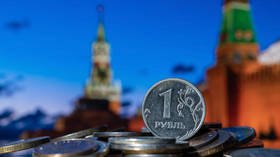Russia looks to retire pricey ruble bonds to ensure economic stability

Russia’s Ministry of Finance is considering a buyback of floating-rate ruble bonds sold to boost emergency funds amid the Covid-19 pandemic, according to Deputy Finance Minister Timur Maksimov.
“The goal is to restore the right structure of the portfolio so that in the next crisis, government debt can be used to conduct an active economic policy again,” the government official said in an interview with Bloomberg.
Also on rt.com Russia’s gold & foreign currency reserves break through $590 BILLIONReturns from floating-rate bonds climb together with the central bank’s key rate. Floating-rate obligations reportedly account for nearly 35% of the ministry’s outstanding local bonds.
According to Maksimov, Russia is planning to cut back the level to 15% or 20% to shift away from the more expensive borrowing in the future.
Last year, the finance ministry had to double the borrowing plan to aid the national economy during the coronavirus pandemic which had been aggravated by plummeting oil prices and Washington’s plan to sanction ruble debt sales.
Also on rt.com Ruble shrugs off latest US sanctions targeting Russian financial marketThe White House introduced the long-feared sanctions on Russia’s debt markets earlier this year, citing Moscow’s alleged meddling with US elections and hacking. The penalty comes into effect on June 14.
“If the market situation allows us to borrow more in advance, we may do so, but we’d work on making the borrowing flow more smoothly,” Maksimov said.
“Our weekly needs, taking into account the amount raised, are now at 45 to 50 billion rubles,” he added.
For more stories on economy & finance visit RT's business section












